|
|
|
Sort Order |
|
|
|
Items / Page
|
|
|
|
|
|
|
| Srl | Item |
| 1 |
ID:
130322
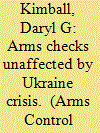

|
|
|
|
|
| Publication |
2014.
|
| Summary/Abstract |
Although the widening confrontation over the political future of the Crimean peninsula and other parts of the former Soviet Union has ruptured already-strained relations between Moscow and the West and put at risk the implementation of some nuclear risk-reduction initiatives and agreements, Russia is not planning to stop allowing the on-site inspections required under the 2010 New Strategic Arms Reduction Treaty (New START), Russian officials said last month. To protest Russia's actions to take control of Crimea, the seven non-Russian members of the Group of Eight (G-8) industrialized countries have suspended Russia's membership in the group. As part of that decision, the seven countries-Canada, Italy, France, Germany, Japan, the United Kingdom, and the United States-changed the location of their planned June summit from Sochi to Brussels. The Russian actions in Crimea have disrupted planning for the activities of the Global Partnership against the Spread of Weapons and Materials of Mass Destruction, which the G-8 launched in 2002.
|
|
|
|
|
|
|
|
|
|
|
|
|
|
|
|
| 2 |
ID:
130356
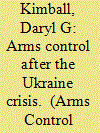

|
|
|
|
|
| Publication |
2014.
|
| Summary/Abstract |
The Global Nuclear Disarmament and risk reduction enterprise is at a crossroads as U.S.-Russian relations have reached perhaps their lowest point in more than a quarter century. Nevertheless, it remains in U.S. and Russian interests to implement existing nuclear risk reduction agreements and pursue practical, low-risk steps to lower tensions. Present circumstances demand new approaches to resolve stubborn challenges to deeper nuclear cuts and the establishment of a new framework to address Euro-Atlantic security issues.
Even before the recent political turmoil in Ukraine and Russian President Vladimir Putin's extralegal occupation and annexation of Crimea, relations between Moscow and Washington were chilly. Despite U.S. adjustments to its missile defense plans in Europe that eliminate any threat to Russian strategic missiles, Putin rebuffed U.S. President Barack Obama's proposal last June to reduce U.S. and Russian strategic stockpiles by one-third below the ceilings set by the New Strategic Arms Reduction Treaty (New START).
Moving forward will be difficult, but doing nothing is not an option. Through earlier crises during and after the Cold War, U.S. and Russian leaders pursued effective arms control and disarmament initiatives that increased mutual security and significantly reduced the nuclear danger. Much has been achieved, albeit too slowly, but there is far more to be done.
As the world's non-nuclear-weapon states persuasively argue, U.S. and Russian stockpiles still far exceed any plausible deterrence requirements, and the use of just a few nuclear weapons by any country would have catastrophic global consequences. As the 2015 Nuclear Nonproliferation Treaty (NPT) Review Conference approaches, pressure to accelerate action on disarmament will only grow.
For now, neither Russia nor the United States wants to scrap the existing arms control regime, including New START and the Intermediate-Range Nuclear Forces (INF) Treaty, which provide greater predictability and stability in an otherwise strained bilateral relationship. A return to a period of unconstrained strategic nuclear competition would not only deepen the distrust and increase dangers for both sides, but also would undermine the NPT. Scrapping the existing nuclear risk reduction measures would do nothing to protect Ukraine from further Russian aggression or reassure nervous NATO allies.
Unfortunately, the profound tensions over Ukraine delay the possibility of any formal, bilateral talks on nuclear arms reductions and missile defense. In light of these realities, Obama and other key leaders must explore alternative options to reduce global nuclear dangers and defuse U.S.-Russian strategic tensions.
|
|
|
|
|
|
|
|
|
|
|
|
|
|
|
|
| 3 |
ID:
134116
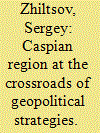

|
|
|
|
|
| Publication |
2014.
|
| Summary/Abstract |
The author concentrates on the geopolitical games in the Caspian region and identifies the factors that have remained prominent in the last twenty years and, in fact, determined the developments in this part of the world, viz. oil and gas reserves, the scope of their industrial production, and the recently built export pipelines as geopolitical instruments of the Caspian states and extra-regional players.
He analyzes the geopolitical aims of Russia, the European Union, the U.S., and China, the key players responsible for the Caspian geopolitical context, to conclude that the region's geopolitical, social, economic, and political future, as well as its interstate relations largely depend on the pace at which oil and gas is produced and pipeline projects implemented
|
|
|
|
|
|
|
|
|
|
|
|
|
|
|
|
| 4 |
ID:
129429
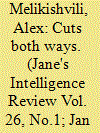

|
|
|
| 5 |
ID:
133163
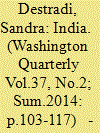

|
|
|
|
|
| Publication |
2014.
|
| Summary/Abstract |
The year 2014 will prove crucial for Afghanistan. The presidential elections will shape the country's political future, both who will govern and how much the process of democratic consolidation will have advanced. On the military front, by the end of the year, the International Security Assistance Force (ISAF) mission is expected to withdraw all combat troops from the country. While the United States and other Western countries are planning to stay engaged in Afghanistan after 2014 through the presence of training and counterterrorism forces, in late 2013 and early 2014 the difficulties in finalizing a Bilateral Security Agreement (BSA) between the United States and Afghan governments led to calls for a "zero option"-a complete departure of all foreign troops from Afghanistan by the end of 2014, leaving the country alone to manage its security, train its armed forces, and fight extremist groups.
|
|
|
|
|
|
|
|
|
|
|
|
|
|
|
|
| 6 |
ID:
145496
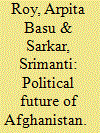

|
|
|
|
|
| Publication |
New Delhi, KW Publishers Pvt Ltd, 2016.
|
| Description |
xxi, 242p.hbk
|
| Standard Number |
9789383649754
|
|
|
|
|
|
|
|
|
|
|
|
Copies: C:1/I:0,R:0,Q:0
Circulation
| Accession# | Call# | Current Location | Status | Policy | Location |
| 058684 | 958.1047/ROY 058684 | Main | On Shelf | General | |
|
|
|
|
| 7 |
ID:
115494
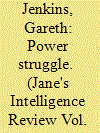

|
|
|
| 8 |
ID:
081307
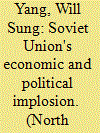

|
|
|
|
|
| Publication |
2008.
|
| Summary/Abstract |
This paper examines the outlook of North Korea's economic and political future. It argues that North Korea will most likely demise the same way as the Soviet Union. That is, an economic implosion will occur causing the political collapse of North Korea. Contrary to popular belief that North Korea will sustain itself if it reforms its economic policies, this paper argues that regardless of reform, North Korea will not be able to avoid the collapse of the state and the Kim regime for that matter. The only impact reform will have is in regards to time as it will merely delay the process of North Korea's collapse. The author wishes to stress that this assessment of North Korea's future will likely show its greater impacts after Kim Jong Il has passed. It is unlikely that North Korea or the regime will collapse under Kim Jong Il's reign because his regime still has a strong authoritative grip over his state, which he controls by being the commander of the North Korean People's Army and various paramilitary apparatuses, and by control of the media. However, the decisions that Kim Jong Il makes now will be the indirect cause of various unintended impacts in the future.
|
|
|
|
|
|
|
|
|
|
|
|
|
|
|
|
| 9 |
ID:
129323
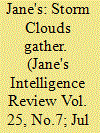

|
|
|
| 10 |
ID:
126010
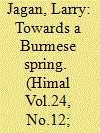

|
|
|
|
|
| Publication |
2011.
|
| Summary/Abstract |
How much difference a year can make! The walls of closed society seem to be falling in Burma. But will the army remain silent?
Change is in the air in Burma, according to many in Rangoon. Though how long until the winds shift remains an open question. 'There's definitely a Burmese Spring here,' said a senior member of Aung San Suu Kyi's National League for Democracy (NLD), on condition of anonymity. 'But whether it's only an illusion, a false dawn as we have had many times before, only time will tell.' Nonetheless, many in the pro-democracy movement within Burma are optimistic, believing that the new president, Thein Sein, is serious about economic and political change. Critically, this is a process that seems to include Suu Kyi herself, though for the moment it is very unclear what role she may play.
|
|
|
|
|
|
|
|
|
|
|
|
|
|
|
|
| 11 |
ID:
129223
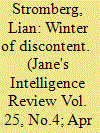

|
|
|
| 12 |
ID:
133575
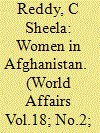

|
|
|
|
|
| Publication |
2014.
|
| Summary/Abstract |
According to C Sheela Reddy, women have been the worst sufferers in the post-Taliban period in Afghanistan. Without protecting their position and status from Taliban infl uenced elements and the traditional Islamic patriarchal society, it is naïve to think that the political future of the country will be peaceful and prosperous.
|
|
|
|
|
|
|
|
|
|
|
|
|
|
|
|
|
|
|
|
|